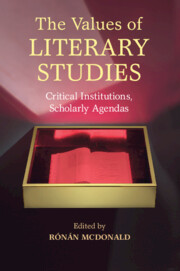Book contents
- Frontmatter
- Contents
- Notes on Contributors
- Acknowledgments
- Introduction
- 1 The Value of Criticism and the Project of Modernism
- 2 Caprice: Individual Subjectivity in Literary Criticism
- 3 The Phenomenology of Literary Valuation
- 4 Literature Is History: Aesthetic Time and the Ethics of Literary Will
- 5 Dead on Arrival: Time and the Value of Old Books
- 6 The Price of Value
- 7 To Shelter the Nothing That Happens
- 8 When Literary Criticism Mattered
- 9 Literature among the Objects of Modernist Criticism: Value, Medium, Genre
- 10 “Vale!” : Psychoanalysis, Value, and Literature
- 11 Afterlives of Comparison: Literature, Equivalence, Value
- 12 Feminism, Gender, and the Literary Commons
- 13 The Value of World Making in Global Literary Studies
- 14 Multiple Versions and Fictional Minds: Manuscript Research, Digital Editing, and Enactive Cognition in Literary Studies
- 15 After Suspicion: Surface, Method, Value
- 16 Literary Experience and the Value of Criticism
- Index
14 - Multiple Versions and Fictional Minds: Manuscript Research, Digital Editing, and Enactive Cognition in Literary Studies
Published online by Cambridge University Press: 05 November 2015
- Frontmatter
- Contents
- Notes on Contributors
- Acknowledgments
- Introduction
- 1 The Value of Criticism and the Project of Modernism
- 2 Caprice: Individual Subjectivity in Literary Criticism
- 3 The Phenomenology of Literary Valuation
- 4 Literature Is History: Aesthetic Time and the Ethics of Literary Will
- 5 Dead on Arrival: Time and the Value of Old Books
- 6 The Price of Value
- 7 To Shelter the Nothing That Happens
- 8 When Literary Criticism Mattered
- 9 Literature among the Objects of Modernist Criticism: Value, Medium, Genre
- 10 “Vale!” : Psychoanalysis, Value, and Literature
- 11 Afterlives of Comparison: Literature, Equivalence, Value
- 12 Feminism, Gender, and the Literary Commons
- 13 The Value of World Making in Global Literary Studies
- 14 Multiple Versions and Fictional Minds: Manuscript Research, Digital Editing, and Enactive Cognition in Literary Studies
- 15 After Suspicion: Surface, Method, Value
- 16 Literary Experience and the Value of Criticism
- Index
Summary
Literary studies have changed due to digital technology. The understandable result is a tension between an enthusiastic embracing of digital humanities and a cautious resistance against this embrace. The tension is related to the notion of measurability, which defines the academic environment we now find ourselves in. Whereas a few decades ago, the prestige of the humanities was unquestioned, the current situation at most universities is different in that it is the sciences that have the prestige. The result is an increasing institutional pressure on literary studies to be “scientific.” The discipline of literary studies is trying to find its bearings in an environment dominated by a culture of measurement. Digital tools can be of help in obtaining measurable data, if that is what literary critics want. For instance, the shift from “close reading” to what Franco Moretti has dubbed “distant reading” is based on the measurability of big data, analyzable thanks to digital technology.
But the digital turn is not just a question of technology. It is above all a matter of methodology. For instance, in order to recognize an author or to define a genre (such as the Gothic novel) literary scholars used to base their analyses on striking or conspicuous characteristics of form and style. Digital text analysis, on the contrary, works with inconspicuous function words such as the or a. This implies that there are formal aspects of literature that cannot be detected with the human eye without digital help. Digital text analysis thus facilitates diverse forms of serendipity and unexpected discoveries, which in their turn generate new research questions.
One of the consequences of working with digitized texts is an enhanced awareness of versions. Digital editing buttresses archival work in important ways, and it is undoubtedly one of the reasons for the recent flourishing of genetic criticism, the study of writing processes. In this essay, I would like to investigate to what extent this particular aspect of literary studies can be of value to other research, both in the humanities and in the sciences, notably cognitive sciences. My research hypothesis is that the multiplicity of versions, which is characteristic of literary writing processes, not only accords with recent findings in cognitive philosophy or neurophilosophy, responding to advances in cognitive sciences, but also constitutes a rich potential for research into the human mind.
- Type
- Chapter
- Information
- The Values of Literary StudiesCritical Institutions, Scholarly Agendas, pp. 220 - 234Publisher: Cambridge University PressPrint publication year: 2015
- 1
- Cited by

